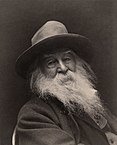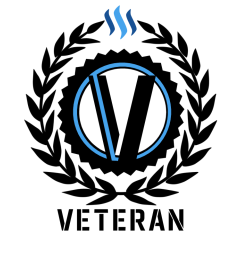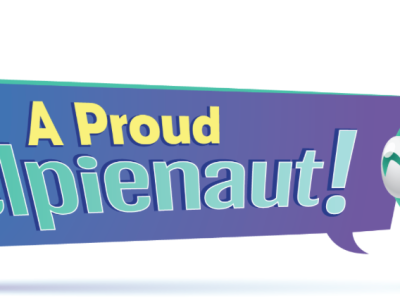Poetry Sunday: We All Sing America Now
I don't remember exactly when I got the inspiration to write this poem. More significant is its meaning and inclusion in the American pantheon of poetry. It rides on the coat tails of two earlier poems written by greater poets than I.

Public Domain image from Wikipedia
Inside Leaves of Grass is Whitman's poem "I Hear America Singing." It's a short poem relative to some of his others, but it's also a poem of great praise for the American spirit. Whitman makes it perfectly clear whose honor his head is nodding toward with these opening lines:
I hear America singing, the varied carols I hear,
Those of mechanics, each one singing his as it should be blithe and strong,
The carpenter singing his as he measures his plank or beam,
The mason singing his as he makes ready for work, or leaves off work,
Whitman considered himself a common man's poet, and his attempt with Leaves of Grass was to write in such a way that he revealed and praised the American spirit of democracy, of freedom, and equality. Those were his values, and he believed they were the values of America. And he wrote in a style and form that would elevate those values. "I Hear America Singing" is a great example of that style and form.

Public Domain image from Wikipedia
Influenced by Whitman, Hughes insisted that he and his fellow black Americans be included in Whitman's America with the poem, "I, Too." The following lines from that poem encapsulate Hughes' vision of freedom and equality with succinct language that bears imitation:
I, too, sing America.
I am the darker brother.
They send me to eat in the kitchen
When company comes,
But I laugh,
And eat well,
And grow strong.
It is in this same spirit and tradition that I wrote "We All Sing America Now." Some time after returning home from Iraq, 2006 or 2007, I sat down and penned these verses giving full credit to Whitman and Hughes for the inspiration through allusion and similarity in style and form. The poem is included in my poetry collection titled Rumsfeld's Sandbox. I hope you like it.

We All Sing America Now
I sing America, too.
I sing America the beautiful, America the ugly,
washed in the blood, cast in the pit,
on loan and drawing interest.
I sing America broad and bold,
cold and hot, rich and poor, dirty and clean.
I sing America on the silver screen.
I sing her golden on wings of wax.
I sing America’s spacious skies and equally her specious lies.
I sing her mountains majestic, purpled and passioned
with rock and snow; and her waves of ambered grain.
I sing America on Elm and on Main.
I sing America lullabies!
I sing America’s blues, her smooth cool jazz,
the rockabilly swing of garage bands doing cover tunes,
bubble gum pop and country-western ballads,
soundtracks, remixes, John Cage and his chance variations.
I sing America loud, piano man.
I sing America corporate. Her white collar crimes
and petty thieves tossing crumbs at stool pigeons.
Overfilled jail cells, missing children and battered wives,
homeless men and the men who once employed them, just
and unjust wars, illegal aliens and the landlords who house them.
I sing America’s colors.
I sing of her blue and gray, her black and white,
and all the colors of the rainbow. The colors
of Whitman in his hospital room
kissing the soldiers calling out Mama’s name
and Langston with his brothers pushing brooms.
I sing all the colors just the same.
Ye poor, ye tired, ye huddled masses,
ye Shinseki’d, ye whistle blowers,
ye union workers on the docks,
school teachers, ministers, truck drivers,
farmers, all ye who toil and labor for a day,
even you self employed filing your 1099s,
put down your awl, your pike, your oil of production,
put down your picket sign, your peace sign, your sign of second comings,
put down your axe, America,
pick up your flag and sing.

Review Me, Please

If you like "We All Sing America Now," check out more of my poetry:
- Cigar
- Music
- The Ballad of the Crustacean King
- Nocturne: Battlefield Sonnet
- Tattoo
- 20 Acres
- The Journeymaker's First and Last Hope
- Old Goth
And the backside 5 (my latest five posts):
- Review Me, Please
- Weird Fiction: Shopping for Feelings
- Even Crypto Relationships Require a Lot of Freaking Work
- The Saddest Tale Ever Told
- Feral Spirit: Steem Monsters Character Card Backstory Entry

Join us @steemitbloggers
Animation By @zord189
 ">
">created and used by veterans
with permission from @guiltyparties


@blockurator,
Famously, or infamously, I would beg to differ that Walt Whitman was a Great Poet ... or that matter, whether being the Father of Free Verse ought to be considered a compliment.
Anyway, I thought your work was an interesting adaptation ... a balance of the good and bad we find in society and culture and I think Whitman, a Modernist, would probably have approved.
Whitman lionized Lincoln and "A More Perfect Union" captured the ineffable reality of nations: It is both an acknowledgement of present imperfection ... but also, an admission that absolute perfection can never be achieved.
Recall that "Utopia," the fantasy of Post-Modernists, comes from the Greek, "ou-topos" meaning,"Nowhere."
Of course, such things are a matter of taste. Each to each, every poet to his own.
If Whitman is great, it's simply for being such an inspiration to so many others who have come after. He did have some interesting turns of phrases and, for his time, an interesting perspective on poetics. Though, I wouldn't call him a Modernist. That would put him in the same category as Pound and Eliot. He isn't easily categorized as far as schools go, falling betwixt the Romantics and the Victorians. Some people call him a Transcendentalist (which I find elusive), and others say he's one of the Romantics (which is more easily defended but not quite right either). I have heard some refer to him as a Realist, but that depends on how you define Realist.
In truth, I think he is his own category, and that's where his "greatness" lies. A man that can create his own category and stay there without company deserves at least a nod of appreciation. While he doesn't fit easily in any other school of poetics, he has had a profound impact on just about all of them that have followed (Modernists, Beats, Confessionalists, Black Mountain, and Language Poets, to name a few).
Always love to spar, my friend. Thanks for reading.
@blockurator,
First off, you are an excellent writer. And thanks for making the effort to edit your comments before hitting the "Post" button. The quality of the craft is noted.
You're right, of course ... Whitman is in his own category which, I suppose, deserves a tip of the hat for originality. I don't really dislike Free Verse as much as I let on, it's just that so many poets go to it because it's easy and learn nothing about the science and art that underlie poetry composition. As nothing is right then nothing is wrong. In the anything goes ethos of post-modernism, Art gets to be anything that anyone says is Art ... no filters or quality-control. The result: Modern-day poetry.
Do you honestly think anyone will be quoting modern-day poets in 400 years like we presently quote Shakespeare? No one quotes them now.
In any event, I've taken it upon myself to fight an undoubtedly losing battle: The resurrection of "verse"... which now, rather ironically, is referred to as "New Formalism." Despite the long litany of literary giants that preceded them, all of whom wrote verse, the Free Verse folks are asserting "default status" ... verse has become some "exceptional."
I used to regularly volunteer at my daughter's Elementary School. In kindergarten and Grade 1, the kids loved poetry and I used to read them mine and others' works. In Grade 2, the teachers introduced them to Free Verse. And that was the precise moment that they started hating poetry.
I'm in advertising and I've done several studies on people's reaction to poetry. It's not that the general public think free verse is bad poetry per se ... it's that they don't consider it poetry at all. There's nothing mysterious about the reason why. I've explained the neuroscience behind the effect of verse in several of my posts if you're interested. Few poets are. Philosophically, most poets consider themselves "thought leaders" (we're an arrogant bunch) but as I've pointed out, if no one is following you ... you're not a leader of anyone or anything.
In reality, modern-day poetry has become post-structuralism on steroids and a venting mechanism for post-modern (Marxist) political and philosophical ideology. As a soldier, I spent 5 years in Africa at the end of the Cold War. If people only new what Marxism actually looks like in its implementation ... the difference between the theory and the reality. It's a
bloody nasty business.
Quill
I don't disagree with any of that. As a group, however, I don't think the New Formalists are any more humble than any other poet. They just know how to rhyme. ;-)
@blockurator,
I know I'm not. :-)
I will say this. While I write primarily in free verse (but certainly not always), when I do, I often incorporate formalist poetics into them. Most people probably don't notice, or don't recognize it. I'm a big proponent of learning the techniques that poets have always used.
@blockurator appreciated this comment via @poetsunit

DISCORD - @poetsunited - witness upvote
It reads like one of our praise poems. It reminded me of Thabo Mbeki's "I'm an African" speech, - delivered in 1996, Parliament of the Rep South Africa.
I am honored. That's a beautiful speech.
Hi blockurator,
Visit curiesteem.com or join the Curie Discord community to learn more.
God this was a good one! It's not everyday you see a creative poem that isn't about love. Resteemed
Ha ha, thanks.
Beautiful poem. I wish I could write one :)
About Walt Whitman, thanks to Dead Poet Society, I remember one of his line: "O captain my captain!"
Oh, yes. Wasn't that a great movie? And that poem is also a great poem, about Abraham Lincoln, upon his assassination.
Exult O shores, and ring O bells! But I with mournful tread, Walk the deck my Captain lies, Fallen cold and dead.Thanks for reading.
Beautiful poem. I sing America too!😁😁
#steemitbloggers!
Thank you.
Nice poetry. Good post.
Thank you.
upvoted from the whaleshares show!
Thank you. I had a great time with you all.
I learned from this post.
Whitman and Hughes, first time ive read about them :o
Very deep with historical significance, I like how you alternate the good and bad. Its like riding on a wave. Something that shifts you from relaxed to a bit negative reading it.
Thanks. Glad it moved you. I'm sure, wherever you're from, you have your poets of historical importance. Celebrate them.
That's a very good idea! I will research and see :)
🇵🇭